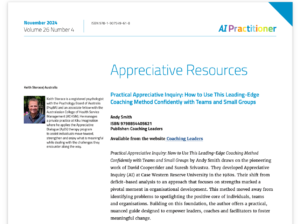Why We Assume That Something Is Working For Every Client

[ad_1]

The Thin Book of Appreciative Inquiry, an excellent introductory book by Sue Annis Hammond, is unusual among Appreciative Inquiry books in that it doesn’t set out the ‘five principles’ (Constructionist, Anticipatory, and so on) as fundamental to the approach.
Instead, it lists eight ‘assumptions’ – some of which map on to the standard principles fairly closely, but some of which bring their own insights about Appreciative Inquiry in ways that the principles don’t (unless you apply a very broad and open-textured interpretation).
The assumption with the most valuable additional insight, in my view, is the first one:
‘In every society, organization, or group, something works.’
If we apply this idea to one-to-one coaching, we can reword it as something like:
‘In every client’s situation, there is something working.’
What are the implications for the coaching process of making this assumption?
First, let’s consider if we should be making assumptions at all. Years ago when I was training lecturers at a further education college in Appreciative Inquiry, and I mentioned the ‘something is working’ assumption, an engineering lecturer said, “When we trained as engineers, we were taught that ‘when you assume, you make an ass out of u and me.’”
This is a valid way of looking at things when you’re dealing with, say, a petrol engine, which is complicated rather than complex, and isn’t affected by you observing it. The engineer is conscious, the engine is not. Also, when engineers inspect an existing system, they’re generally aware that there’s a fault, and they’re looking for the cause of it.
Human beings are different. Any system involving even a single human being is complex and unpredictable.
And as soon as you start asking questions of a human ‘system’, you affect a number of variables in that system: the direction of the person’s attention, what they are thinking about, how they represent what they’re thinking about (visual images, sounds, internal dialogue, feelings, and so on), how they interpret the wording of the questions, how they interpret the tone of the questions, their resulting emotional state, and more.
That in turn affects the coachee’s ability to reframe their situation in productive ways, and to come up with new ideas and options to overcome their challenges and achieve their goals.
When we coach with Appreciative Inquiry, we are interested in identifying what’s working already and what has worked in the past (so that the coachee can get better results in future by doing more of what works for them).
On the principle that we get more of what we focus on, operating from the assumption that there is something working makes it much more likely that we’ll find it.
In the next article we’ll take a closer look at the mechanics of how this works, and how our questions influence the attention and internal state of the coachee.
[ad_2]




